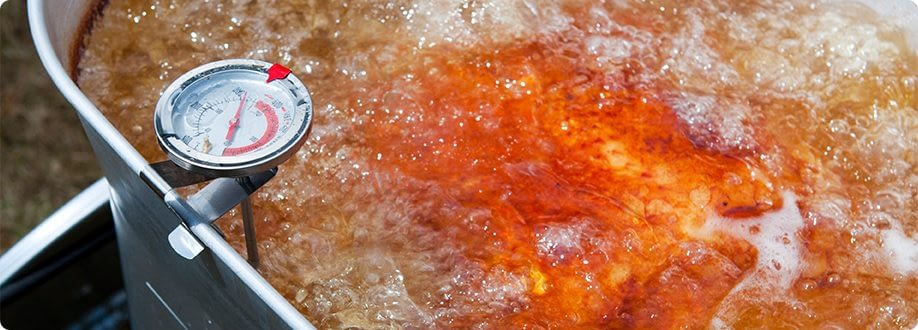

Fire in the hole!
As delicious as a plate of crispy turkey may be, the National Fire Prevention Association (NFPA) actually discourages the use of any outdoor gas-fueled turkey fryers, no matter how safely you operate one. So if Uncle Bob still insists on frying the bird, offer the option of an outdoor turkey cooking appliance that doesn’t use oil, or suggest purchasing a fried turkey from a specialty grocery store. If he won’t go for any of those options, at least put these safety tips into action. That way, there’s food and frivolity — not fireworks.
- Location, location, location. Always place your turkey fryer outdoors and at a distance from your home, outbuildings, fences, and trees. Never use in, on, or under a garage, breezeway, carport, porch, or any structure that can catch fire, and make sure the fryer is in full view while the burner is on. And keep the kids and pets indoors while the cooking is underway.
- Pay attention to proper prep. The United States Department of Agriculture (USDA) recommends thawing your turkeycompletely (24 hours for every 4 to 5 pounds) and to pat it dry thoroughly before cooking. Partially frozen or wet turkeys can make the hot oil splatter when it’s immersed, which can lead to burns and injuries. And watch the weather — rain or snow can cause dangerous steam and spitting oil.
- Watch the temperature. The USDA warns that a deep fryer’s temperature can surge well beyond 350 degrees and the bubbling cooking oil is highly combustible. Vapors can ignite quickly, so to ensure Uncle Bob keeps those expressive eyebrows of his, monitor the Fahrenheit and use extreme caution when submerging and removing the turkey. The Consumer Product Safety Commission (CPSC) warns that if there’s smoke, your oil is overheating, so turn the burner off immediately if you see any evidence.
- Be prepared. Cooking can be dangerous no matter how or where you’re operating, so always be sure to have a multipurpose, dry-powder fire extinguisher ready to go should your project go rogue. The USDA warns against extinguishing grease fires withwater — call 911 immediately. And the less your skin is exposed, the better. Be wise and wear protective clothing.
- Select a safe size. Most fryers can accommodate a 12-16 pound turkey. If the bird is any bigger, it may not fit into the appliance and it’ll take exponentially more time to cook. As always, it’s really important to read the manufacturer’s instructions that come with your fryer, and take special heed of the recommended water and oil levels and submerge the bird slowly.
- Keep the stuffing separate. As delicious as cornbread stuffing is, don’t pack your bird to the brim with it. In fact, according to the Centers for Disease Control (CDC) it’s best to bake the stuffing separately no matter how you’re cooking your turkey to avoid food-borne illness. Remember, good old Tom (and the stuffing) should have an internal temperature of 165 degrees Fahrenheit.
For more information
For more outdoor and food safety tips, check our partner Grinnell Mutual’s Front Porch Blog.
The information included in this publication was obtained from sources believed to be reliable, however Grinnell Mutual Reinsurance Company and its employees make no guarantee of results and assume no liability in connection with any training, materials, suggestions or information provided. It is the user’s responsibility to confirm compliance with any applicable local, state or federal regulations. Information obtained from or via Grinnell Mutual Reinsurance Company should not be used as the basis for legal advice or other advice, but should be confirmed with alternative sources.
Filed Under: Blog, Homeowners Insurance | Tagged With: inusurance, thanksgiving
